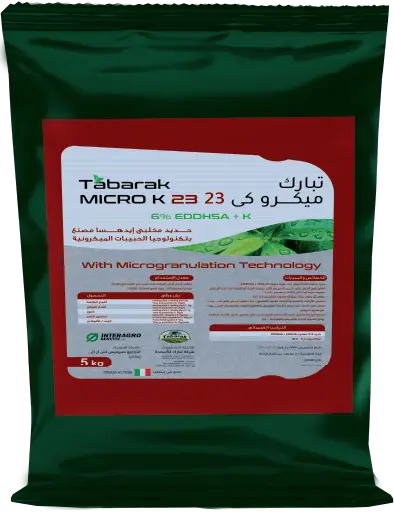Tabarak Micro K 23
• 6% Chelated Iron chelated on EDDHSA
• 23% Complex Potassium in the form of Micro Granulation
Powerful Potassium Boost for Your Plants
Tabarak Micro K 23 is a specialized microgranular fertilizer designed to provide a potent dose of chelated potassium and iron, effectively addressing zinc deficiencies in your crops. This advanced formula ensures optimal nutrient uptake and promotes vigorous plant growth.
Key Composition & Benefits
Chelated Iron (EDDHSA): Iron is essential for chlorophyll production, contributing to vibrant green foliage and healthy plant growth. The EDDHSA chelation enhances iron availability and prevents nutrient lockout.
Chelated Potassium: Provides readily available potassium, crucial for strong stems, improved fruit quality, and enhanced disease resistance. The chelated form ensures efficient absorption by plants, maximizing its effectiveness.
Application and Dosage
Tabarak Micro K 23 is specifically formulated to treat zinc deficiencies. The optimal dosage may vary depending on soil conditions and crop type. Always follow the recommended application guidelines for best results. Consult a local agricultural expert for tailored advice.
Microgranulation Technology
The microgranular formulation of Tabarak Micro K 23 ensures even distribution and prevents clumping, leading to uniform nutrient application across the field. This technology optimizes nutrient uptake and minimizes waste, contributing to greater efficiency and cost-effectiveness.
Superior Nutrient Uptake
The chelated nature of both potassium and iron in Tabarak Micro K 23 ensures rapid and efficient absorption by plant roots. This promotes faster nutrient uptake, leading to quicker growth and improved overall plant health. The readily available nutrients are immediately utilized by the plants, maximizing the benefits of the fertilizer.
Enhanced Plant Health and Yield
By addressing zinc deficiencies and providing essential potassium and iron, Tabarak Micro K 23 contributes to enhanced plant health, increased yield, and improved crop quality. The improved nutrient status leads to stronger plants, better fruit development, and higher overall productivity.
